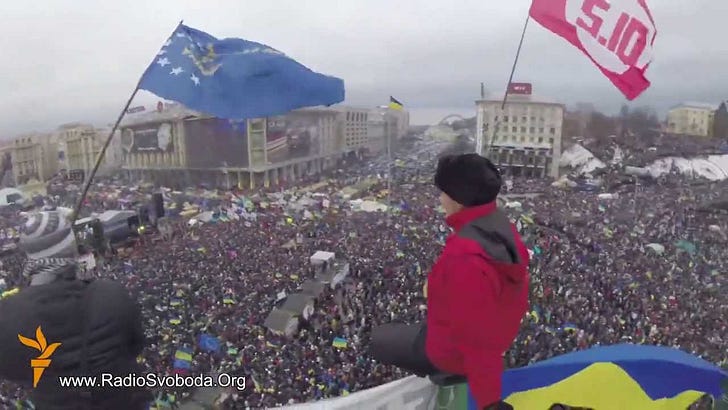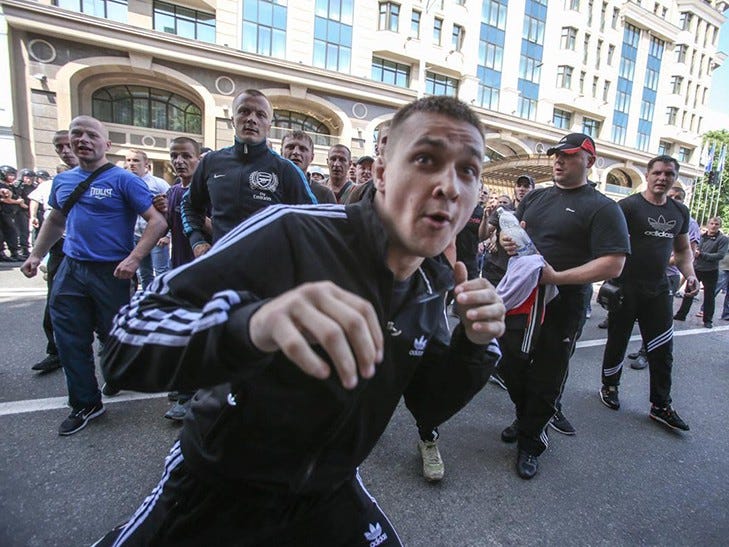May 27: Serhii Antonov: War in Donbas in 2014- Part 1
Thread published May 23, 2023 on Serhii Antonov's memoirs of the war in Donbas in 2014
Serhii Antonov: War in Donbas in 2014
As a resident of Donbas, I was asked to tell about the beginning of war in Donbas in 2014.
But this is a long story. So I'll do it in a few threads over the next few days.
I realized that before I talk about the beginning of the war in Donbas, I need to talk a little about the period before the war. In particular, about Yanukovych's term (because during his term, Russia started taking over Ukraine) and about the Revolution of Dignity. After all, for those who do not know this period, the following story may be incomplete. In addition, Russian propaganda also pays attention to this topic.
I have repeatedly seen how Russian propaganda, through its Western servants, distributed the map of the presidential elections in 2010, in which Ukraine is divided in half. At the same time, they claim that this is a map of the pro-Russian population and that these regions should be given to Russia.
Yanukovych focused more on economic issues and his program was populist. He spoke "for everything good and against everything bad." And the majority in his program could find something of their own and interpret it in their own way.
As for the Ukrainian language, his program stated that it remains the only state language. And the Russian language and other languages have the right to exist in Ukraine. That is, he repeated what was stated in the constitution and how it worked before and after his tenure.
Yanukovych's pre-election program was not pro-Russian, he spoke Ukrainian and never advocated joining Russia before the election.
Yanukovych positioned himself as a politician who is friendly to Russia but who will cooperate closely with Europe. That is, he showed some neutrality between East and West and his neutral path. Like President Kuchma. And the majority of Ukrainians (until 2014) supported it. The majority of Ukrainians did not support the idea of joining NATO. After all, when we gave up nuclear weapons, the USA, Britain, Russia and other countries guaranteed our sovereignty and territorial integrity. As history has shown, these hopes were in vain and Russia violated the agreements.
But some Ukrainians remembered well the history of the extermination of Ukrainians by the Russians and were worried about Russia's attack on Georgia in 2008, which showed that Russia has not changed and will repeat its fascist-imperialist path. They turned out to be right. The share of these Ukrainians, in my subjective opinion, was 20%-30%, including me. It should be noted that these are people who did not want a war with Russia and did not plan for it. But based on historical and modern realities, it was suspected that Russia would try to seize Ukraine or part of it in one way or another.
And when Yanukovych finally canceled the European integration processes in November, people took to the streets both those who were against the cancellation of this process and those who feared that Russia, through Yanukovych, had started the process of absorbing Ukraine. There was another group of people who opposed the government because of great corruption and the transformation of the state into a totalitarian one. Or those that came out due to a combination of these factors.
However, the final factor that pushed the protests into the Revolution of Dignity was the beating of protesters in the center of Kyiv. Then a peaceful and legal rally, which at the time consisted mainly of young people, was surrounded and then beaten by the police. The police beat people lying down. They even beat journalists. Then on December 1, hundreds of thousands of Ukrainians came out in response to this brutality, the beginning of the establishment of a dictatorship and the suppression of people's rights. From that time, people did not leave the central square of Kyiv until Yanukovych fled to Russia.
The first video shows the beating of protesters in the center of Kyiv. The second video is the start of the Revolution of Dignity in response to this.
If we turn to the situation in Donbas, then it was calm there. There were also rallies in support of the Revolution of Dignity. Personally, I periodically traveled to Kyiv, and when I returned, I went to local protests.
The share of people who were wary of the possibility of Russian aggression there was much smaller. This was caused by several factors.
First, a large percentage of ethnic Russians who did not believe that their ethnic homeland would attack and seize territories. Such a large percentage of Russians is due to several reasons. This is the extermination of the indigenous population due to the genocide of 1932-1933, which is called the Holodomor. At that time, according to scientists' estimates, 4 million to 15 million Ukrainians were exterminated in a year. The second catastrophe is the Second World War - as of 1943, only a third of the pre-war population remained in Donbas. In the 20th century, Donbas was actively populated by immigrants, many of whom were Russians. A similar story was in Lithuania, Latvia, Estonia (you can ask the citizens of these states - how did it turn out that many Russians live there), in Crimea and some other countries that were part of the Soviet Union.
The second reason why people trusted Russia was that Donbas was the most susceptible to Soviet and then Russian propaganda. And the FSB has been luring local officials to its side for a long time.
Even before these events, Yanukovych's government began to attract athletes who, for money, attacked opposition demonstrators and brutally opposed protests. These athletes were called "aunties", since the surname of the first identified athlete was Vadym Titushko. After being identified, he told how the authorities had hired them for provocations, asked for an apology from Ukrainians and promised not to use their combat skills in political processes. These "aunties" were from different regions, but mostly from Kharkiv Oblast and Donbas.
There was another type of mercenaries who were preparing to physically launch protests against the authorities - "Cossacks" (not to be confused with Ukrainian Cossacks). "Cossacks" were actively involved by the Russians to start the war in Donbas. But this is a separate and long story. If you want, I will talk about them separately.
In the photo, Vadym Titushko. Sportsmen who were hired for money to physically disrupt rallies began to be called his last name.
From the end of November to the middle of February, according to my personal observations, more supporters of the Revolution of Dignity went to rallies in Luhansk than in support of Yanukovych. Of course, this does not mean that our views dominated the region. Rather, most people have not decided what to support.
It should be noted that although over time Yanukovych's support in Donbas decreased, his rating was still high. This was achieved with loans (including from Russia), which kept the hryvnia exchange rate stable and social benefits at the same level. Few people understood the state economy and did not understand that the situation would deteriorate in the future.
In my opinion, Yanukovych was going to keep the economy on loans until his second term. If he were re-elected, he would turn into a dictator, like Lukashenko in Belarus. At that time, Yanukovych was already making changes to the constitution and strengthening his power. But he tried to do it gradually so that mass protests did not take place.
Even before the revolution of dignity, the government began to actively broadcast propaganda that the west of Ukraine is the Nazis who want to destroy Donbas. Europe and America want to seize the resources of Donbas.
When protesters were beaten in Kyiv at the end of November 2013, I heard from local residents that it was too much. People were shocked by the aggression of the police. But at this moment, the government increased its propaganda to an incredible level (I do not exclude that more experienced Russian propagandists worked behind the scenes). Stories began that Nazi drug addicts had gathered in Kyiv. "That Euromaidan was created by Europe and the USA in order to impose gay marriages on Donbas and thus reduce the population of Donbas and seize the region's mines and industry." Of course, not everyone believed in it, but most of the marginalized did. Other layers of the population had their own propaganda, which also brought success, but not as good as that of the marginalized.
Old people who have been horrified by the "terrible and incomprehensible event" since the time of the Soviet Union believed in the low-grade propaganda. It also happened that in Donbas there is a relatively high percentage of marginals (higher than in other regions) and people who, apart from Russia, have never been abroad. It was they who believed in this nonsense.
I will also note the Russian Orthodox Church's involvement in the propaganda. In fact, since Soviet times, the top of this church has been closely connected with the KGB, and now the FSB. They then declared that all governments are from God and cannot be changed (it is interesting that when Yushchenko was President, they did not say this). They also said that Europe is full of sin and only those countries that are with Russia will be able to save themselves from the Antichrist and be with God.
You can talk about the Russian Orthodox Church for a long time on a whole separate thread. But I will come back to it when I write about spring 2014.
I do not claim that the majority of the population of Donbas are marginalized. But I paid attention to pensioners, supporters of the Russian church and marginals, because they were the main gate for the Russian special services and the army.
The rest of the population did not so categorically support Russian propaganda until the end. And there were different opinions among them.
I think I'll wrap it up for today.
To continue the story, I will create a new thread tomorrow, in which I will tell about the chronological events since February 2014.
All these events took place almost 10 years ago, so I could have forgotten something. In addition, I will try to answer questions, if any, that relate to the events before the Revolution of Dignity and before January 2014.
Note about Vadym Titushko





